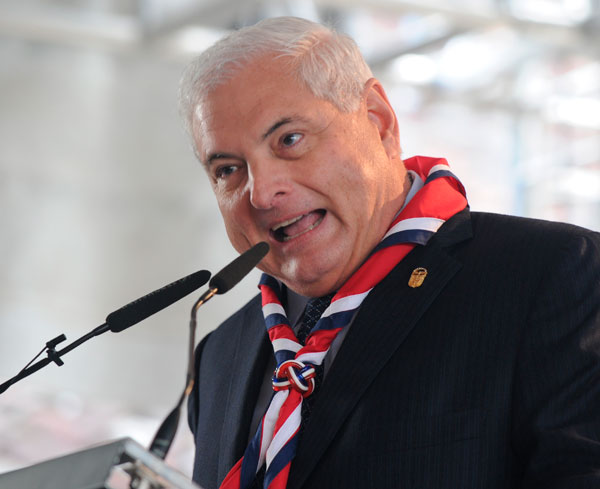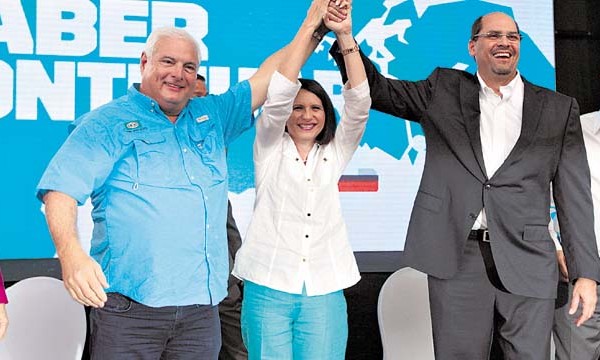
If he could run for reelection, it seems certain that Ricardo Martinelli, the grocery chain tycoon-turned-politician, would almost certainly win a second term in office — he’ll leave the Panamanian presidency this year with approval ratings in excess of 60%.
But with Panama’s law prohibiting consecutive terms, the closest Martinelli can come to a second term is by supporting the ticket of his own center-right Cambio Democrático (CD, Democratic Change), whose vice-presidential candidate is Panama’s first lady, Marta Linares de Martinelli.
* * * * *
RELATED: The internal politics of the widening of the Panama Canal
* * * * *
Martinelli has a strong record. Panama’s economy has grown by an average of between 8% and 9% through his five-year term (significantly boosted by the revenues garnered from the country’s eponymous canal.). He’s also introduced supplementary pensions for Panamanians over 70, built Panama City’s metro system, and spent around $20 billion on infrastructure projects. That includes the $5.25 billion Panama Canal expansion initiated by his predecessor, though the expansion has faced cost overruns and worker strikes that have postponed the expected completion date from 2015 to 2016.
He’s faced accusations, however, that he’s undermined Panamanian democracy, bullied opponents and presided over such a culture of corruption that Martinelli himself may face bribery charges in Italy after leaving office.

Critics argue that the CD’s presidential candidate, José Domingo Arias, another former businessman who served two years as minister for foreign trade and three years as minister for housing and land development under Martinelli, is merely a figurehead. They worry that if Martinelli’s wife (pictured above with Martinelli and Arias) is vice president, the incumbent will continue to control too much power in Panama. Despite a constitutional provision that appears to limit family members of the incumbent from running for president or vice president, Martinelli’s allies on the Panamanian supreme court have not blocked Linares’s vice presidential candidacy. But there’s also a sense that most Panamanians realize this going into the weekend’s vote.
In a fierce column for the Wall Street Journal last month, Mary O’Grady chastised Martinelli for trampling Panamanian democracy. She was shocked (shocked!) that a Central American president may have promised greater spending in exchange for a parliamentary majority over the past five years, and she ultimately compared Martinelli (unconvincingly) to Nicaraguan strongman Daniel Ortega:
In 2012, Mr. Martinelli tried to pack the Supreme Court by adding three new seats to guarantee his influence and raise the odds that he might overcome the prohibition on re-election the way Daniel Ortega did in Nicaragua. When Panamanians went to the streets to resist, he withdrew the proposal. The lust for power remains.
It’s worth noting that even in Costa Rica, which has the best governance standards in all of Central America, two recent former presidents have been convicted of corruption. It’s also a pretty rich argument for a columnist in a country where the frontrunners for the 2016 presidential election are the wife of a former president (Hillary Clinton) and the son and brother of two former presidents (Jeb Bush). Martinelli himself took to Twitter to attack her in a fairly petty retort, which wasn’t perhaps the most convincing step.
All pearl-clutching aside, and without getting into the theoretical question of ‘good corruption’ and ‘bad corruption,’ Martinelli certainly isn’t the first Latin American president on the right or the left to chafe at term limits. Though initially instituted to prevent the kind of personality-based caudillos that had a tendency to co-opt presidential systems throughout Latin America in the 19th and 20th centuries, strict one-term limits make presidents from Mexico to Chile lame ducks from the first day of their administrations. It’s not surprising that politicians like Martinelli (and like former Honduran president Manuel Zelaya) are looking for ways to escape the yoke of single term limits.
The two main challengers to Arias come from Panama’s two traditional parties. Continue reading Panamanian presidential race is all about Martinelli →
![]()



